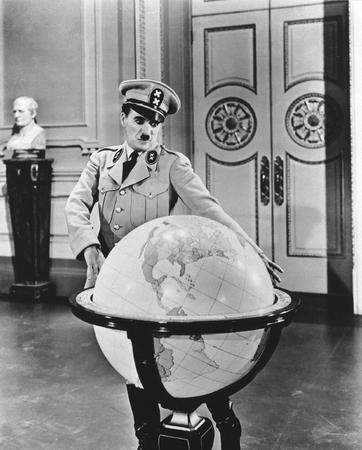The Great Dictator (1940) directed by Charlie Chaplin
Chaplin and Hitler, two men forever linked in our minds because of one distinguishing feature, the toothbrush mustache. How ironic then that one man would help popularize the style and the other would guarantee it'd never become fashionable again. It was this distinguishing similarity that actually inspired Charlie Chaplin to make The Great Dictator, a satire on Adolph Hitler and Nazi Germany, not his best film but perhaps his most important one for its political views and bravery. Chaplin and Hitler actually shared a lot in common; they were born four days apart in 1889, both grew up in relative poverty with alcoholic fathers and ailing mothers, but that is where the similarities stopped. Charlie Chaplin Jr. had this to say about the parallels between his father and Hitler, "Their destinies were poles apart. One was to make millions weep, while the other was to set the whole world laughing." (Wikipedia!)
The Great Dictator begins during World War I where a Jewish barber-soldier (Chaplin) is in the front lines for the fictitious country of Tomania. He helps save the life of a commander by flying them out of trouble, but crashes the plane causing him to get amnesia. Twenty years go by and he is released from the hospital to a different Tomania than he remembered, one where Adenoid Hynkel (Chaplin again) has taken over and where Jews are openly persecuted.
We first see Hynkel delivering a speech to a large crowd in impassioned and fiery German. Chaplin studied Hitler's speeches carefully for this role understanding that Hitler drew much of his power through his oratory skills. He makes it a point model Hynkel after Hitler and to also make him look like a total clown at the same time. In fact, Chaplin is not even speaking German at all, he's just speaking nonsensical gibberish that sounds like German. Perhaps this was a way for Chaplin to point out that Hitler's ideology was in fact pure nonsense. If you listen closely, he even says the phrases "cheese'n'crackers" and "large beer."
The narrative splits its time between the Jewish barber and Hynkel, one story showing the Jewish perspective during Nazi Germany and the other parodying Hitler. Because of this the film can feel a little disjointed as the two stories don't really interconnect until the very end and it goes long stretches (like twenty minutes at a time) without one character or the other on screen. The Jewish barber's narrative seems like its missing scenes at times. For instance, he is shown escaping a concentration camp in a soldier's uniform, yet it never is explained or shown exactly how he escapes which seemed like a perfect spot to put in some classic Chaplin physical comedy and gags.
While the movie is humorous, I wouldn't go as far as to say it is really funny. I smiled at some of Chaplin's antics but never found myself with a full grin. The best parts are obviously when Hynkel is on screen because Chaplin makes sure to poke fun at him as much as possible. I liked the scenes when Benzino Napaloni (a caricature of Benito Mussolini) visits where Hynkel attempts to look more superior to him. It is explained to him that he should always be seated in a higher position looking down on him, leading to a hilarious barbershop scene where both men frantically adjust their chairs up and up.
It's impossible to really talk about this film without discussing the ending, but I don't really think I'm ruining anything by doing so. It should become apparent that at some point the barber and Hynkel will be mistaken for each other. (Otherwise why have the dual roles?) In the end, the barber posing as Hynkel makes his famous speech. Chaplin looks straight ahead to the camera, drops out of character, clearly speaks as himself and delivers a three plus minute monologue, calling out the evils of fascism and prejudice and pleading for freedom and unity. If you stop to think about it, this speech actually disrupts the narrative and has a completely different tone from the rest of the film; you can even go as far as to say it ruins the movie. But isn't this why Chaplin made the film in the first place, to launch an attack on Hitler? It was evident to me while watching it that Chaplin didn't care how this speech looked in the context of the movie, he clearly needed to get this off his chest and I applaud him for the courage and conviction in doing it.
Chaplin started filming The Great Dictator in 1938 when the rest of the world had a policy of appeasing Hitler and Hollywood for the most part remained mum on the subject. Chaplin, who worked independently from the major studios, spent $1.5 million of his own money on the film (if this movie failed it could have bankrupted him). Clearly he felt had something important to say. By the time the film was released in 1940, Germany was in an all out war with the rest of Europe and the film was greeted with open arms. The Great Dictator, while being a good film, is far more important in a historical context than a cinematic one, though often times there is little difference between the two.
Grade: B

No comments:
Post a Comment